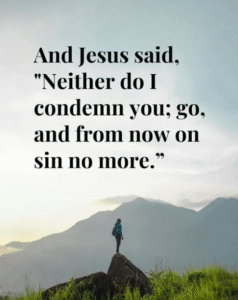The Rock and the Reckoning: A Journey from Condemnation to Grace
There are moments in life when the world feels impossibly vast. When the sky stretches out like a question, and the ground beneath your feet feels both solid and uncertain. You stand alone—on a rock, on a decision, on the edge of something you can’t yet name. And in that moment, you hear a voice. Not loud. Not angry. Just clear.
“Neither do I condemn you.”
It’s not a whisper of permission. It’s a declaration of freedom.
And it changes everything.
🧠 The Weight of Judgment
We live in a world that loves to point fingers. That catalogues mistakes, screenshots failures, and builds algorithms around shame. We’re taught to measure ourselves by perfection, to fear exposure, to hide the parts of us that are still healing.
But the quote in the image—spoken by Jesus to a woman caught in adultery—is a radical interruption of that narrative. She was dragged into the public square, surrounded by men with stones in their hands and judgment in their hearts. They didn’t see her humanity. They saw a headline. A scandal. A target.
And Jesus saw her.
Not her sin.
Her soul.
He didn’t excuse her actions. He didn’t pretend nothing happened. But he did something far more powerful.
He refused to condemn.
And then he gave her a choice.
“Go, and from now on, sin no more.”
Not a command.
An invitation.
To begin again.
🔥 The Rock as Symbol
In the image, the person stands on a rock formation, surrounded by mountains and clouds. It’s a scene of solitude—but not isolation. The rock beneath them is solid, ancient, unmoving. It holds them up. It gives them perspective.
That rock is grace.
It’s the place we stand when we’ve been forgiven. When we’ve faced our failures and found mercy instead of punishment. It’s not soft. It’s not easy. But it’s real.
And it’s enough.
Because grace doesn’t erase the past.
It redeems it.
🧵 The Courage to Walk Away
“Go,” Jesus said.
It’s a simple word. But it carries weight.
To go means to leave behind. To walk away from shame, from patterns, from people who only knew you by your worst moment. It means stepping into a future that hasn’t been written yet. A future where you are not defined by your sin, but by your strength.
And that takes courage.
Because grace is not passive. It demands movement. It asks you to change—not to earn love, but because you’ve already received it.
The person in the image isn’t just standing.
They’re preparing to walk.
Into the unknown.
Into redemption.
🌿 The Sky as Witness
Above the figure, clouds swirl across the sky. Light breaks through. It’s not a clear day—but it’s not a storm either. It’s in-between. Like most of life.
That sky is a witness.
To the battles fought in silence. To the prayers whispered in desperation. To the moments when you almost gave up—but didn’t.
It’s vast, yes.
But it’s also intimate.
Because grace doesn’t just meet you in churches and chapels. It meets you on mountaintops. In hospital rooms. In courtrooms. In quiet bedrooms where you stare at the ceiling and wonder if you’re still worthy.
And the answer is always yes.
Not because you’re perfect.
But because you’re loved.
🕊️ The Absence of Condemnation
“Neither do I condemn you.”
It’s easy to miss how revolutionary that statement is.
Jesus didn’t say, “I forgive you.” He said, “I don’t condemn you.”
Forgiveness implies wrongdoing. Condemnation implies worthlessness.
And he rejected both.
He didn’t just pardon her.
He restored her.
He reminded her—and us—that our value is not erased by our mistakes. That we are more than our worst choices. That mercy is stronger than judgment.
And that’s the foundation of grace.
Not denial.
But dignity.
🎭 The Role We Play
We’ve all been the woman in the story. Caught. Exposed. Ashamed.
But we’ve also been the crowd. Quick to judge. Slow to understand. Eager to throw stones—online, in conversation, in our own minds.
And sometimes, we’re the rock.
The place someone else stands when they need support. When they need someone to say, “I see you. I don’t condemn you. Let’s walk together.”
That’s the role we’re invited into.
Not as saviors.
But as companions.
On the road to redemption.
💡 What We Learn
From this image and its quote, we learn that grace is not abstract. It’s embodied. It’s the hand that doesn’t strike. The voice that doesn’t accuse. The presence that doesn’t flee.
We learn that solitude can be sacred. That standing alone doesn’t mean being abandoned. That sometimes, the most powerful transformations happen in silence.
We learn that forgiveness is not the end of the story.
It’s the beginning.
And we learn that the most radical thing you can say to someone who’s failed is not “You’re wrong.”
It’s “You’re still worthy.”


